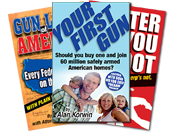
| Home | Books | National Directory | Position Papers | Alan’s Blog | FAQ | New Stuff | Search |
|
The Dangers of BeingGUNLESSby Alan Korwin, Author
Gun Laws of America
Gunless people, those who steadfastly refuse to keep and bear arms, practice marksmanship or learn gun safety create certain burdens for the rest of society. • Gunless people increase the need for police protection, by being unable to fend for themselves in certain dire emergencies. • By remaining unarmed, a gunless person becomes a "free rider," obtaining safety and protection against criminal activity through the responsible actions of others. • Gunless people in general reduce national security. An armed populace is more capable of aiding in national defense, from border risks to crime or terrorism events, and poses a greater deterrent to such activity. • Borrowing the logic from the Wickard v. Filburn case at the U.S. Supreme Court, gunless people have a negative impact on interstate commerce. By failing to keep and bear virtually the only property that is constitutionally guaranteed,* they weaken the economy and contribute to lowered economic stimulus. This is admittedly a somewhat circuitous argument, but it seems quite popular in other arenas (e.g., growing grain for your own use) and so appears germane. • A family that is gunless and feels secure because of it, fails to realize that being gunless is dangerous. The other side of the brag that, "We don't have a gun in OUR house," is "If push came to shove we'd be helpless victims and we plan to leave it that way." This is a person's free choice, but it should be recognized for what it is. • The marginal position that gunlessness at home may reduce the chance of firearms accidents overlooks the fact that one out of two American homes on average has a firearm. Lacking experience, the risk of a gun accident actually increases while not at home, especially for children. • The risk of genocide, as we have seen historically time and again, increases and in fact thrives to the degree with which a population is gunless, either by its own hand, or through the force of others. • People sometimes resist being characterized ("I am not overweight!") and other times they embrace it ("I'm a Steelers fan!"). Being classified as gunless is not a positive thing, if for no other reason than that it relinquishes tactical advantage. • The uniquely Latino characterization of manliness, "machismo," the ability to survive and thrive when aggressive action is called for, is harmed by gunlessness. • Responsible adults do not use the disability of gunlessness to scorn, deride, insult, offend, demean, taunt, scold, mock or ridicule gunless people, even if they sorely deserve it. (Unfortunately, gunless people often show great disrespect for marksmen.) • Being gunless does not increase a person's safety, it puts a person's safety at risk. On a grand scale it reduces the risk criminals face from the public they prey upon, and places a significant burden on the rest of society. A person who chooses to remain gunless unwittingly contributes to making crime easier for criminals. • A significant portion of the population is kept gunless by prohibited-possessor laws, that permanently ban classes of people from firearms ownership, possession or use. Some form of relief from such disability, which does not presently exist, must be made available in order to have due process protection under law. • Although gunlessness has been outlawed in some jurisdictions, most famously Kenesaw, Georgia, to the delight of many gun-rights advocates, it is no more government's role to demand being armed than to demand you have health insurance. It is a person choice and character reference.
So... • If private gun ownership dropped dramatically -- for whatever reason -- would the need for police protection go up or down? • In other words, if the ten-to-one ratio of armed people (estimated at 100 million) to criminals (estimated at about 10 million) suddenly shifted so armed criminals outnumbered armed citizens and criminals had the ten-to-one advantage, would that be good or bad? • Would the criminal element be affected at all if most law-abiding people became gunless, whether through choice, Eric-Holder-style brainwashing, or through legislated denial of the right to arms? • If things were rational wouldn't you expect criminals to already be kept gunless by society? Why aren't criminals gunless? What can be done about that? Are criminals armed despite laws that already forbid them? But I see I repeat myself. •
On a ray of hope, one correspondent pointed out that a gunless person can also be thought of as a potential gun owner. Would that it were so. "Friends don't let friends be gunless" -- words have so much more oomph, as the media so frequently demonstrates, when they are contained in quote marks. Thanks to my Tucson-based friend Charles Heller, Exec. Dir. of JPFO, whose suggestion of Glockless ultimately led me to the term I was seeking. * No other property or objects are guaranteed to We the People, under the Constitution, as directly as "arms" in the Second Amendment. The Second Amendment is an explicit recognition of legal property ownership. Not to be exclusionary, thank you, along with arms, it can be easily argued that an implied right to own Writings and Discoveries exists in Art. I Sec. 8 cl. 8 (copyrights and patents), the right to home ownership is implied in Amendment III (no quartering of soldiers in a house without consent of the Owner), "houses, papers and effects" are enumerated in Amendment IV, unspecified "property" in Amendment V, etc.) ###
Contact: Encourage politicians to pass more laws...
|
 on gun laws and other topics.
|

